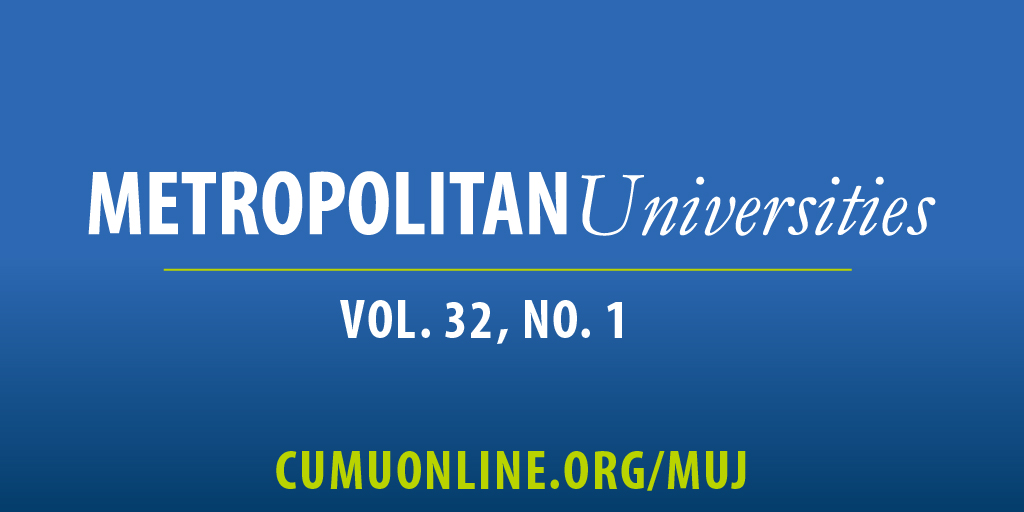Improving Workforce Readiness Skills Among Community College Adult Learners Through New Technologies:
Lessons From Two Schools
DOI:
https://doi.org/10.18060/23884Keywords:
workforce development, adult learners, career and technical education, critical skill development, social and behavioral skillsAbstract
Employers report struggles to find work-ready candidates who possess a desired combination of job-specific technical, general math and reading, and social and behavioral skills. Community colleges are ideally situated to address these shortages, delivering a trained local labor force and often collaborating directly with employers and regional development boards to ensure the employability of their students and the economic vitality of their regions. One tactic to address these shortages is to introduce trainings geared directly toward soft and basic skill development. This paper presents case studies of two schools that use technology-enhanced trainings to incorporate work-readiness skill trainings in career technical education programs that are (1) flexible and learner-centric due to technology-enhanced delivery, and (2) use evidence-based assessment and intervention strategies to promote soft skill and literacy expectations. The trainings were provided by a non-profit education research and measurement company, which served as developer and research partner for the community colleges. Results demonstrate adult learner satisfaction and commitment with these blended learning and mobile technology solutions. Factors that facilitate training success, which include securing student buy-in and developing collaborative partnerships, are discussed.
References
Bauer, K.N., Orvis, K.A., Ely, K. & Surface, E.A.(2016). Re-examination of Motivation in Learning Contexts: Meta-analytically Investigating the Role Type of Motivation Plays in the Prediction of Key Training Outcomes. Journal of Business and Psychology 31, 33–50. https://doi.org/10.1007/s10869-015-9401-1
Brown, J. S., Collins, A., & Duguid, P. (1988). Situated cognition and the culture of learning.
Educational Researcher, 18(1), 32-42. https://doi.org/10.21236/ada204690
Campion, M. A., Fink, A. A., Ruggeberg, B. J., Carr, L., Phillips, G. M., & Odman, R. B.
(2011). Doing competencies well: Best practices in competency modeling. Personnel
Psychology, 64, 225–262. https://doi.org/10.1111/j.1744-6570.2010.01207.x
Casner-Lotto, J., & Barrington, L. (2006). Are they really ready to work? Employers’ perspectives on the basic knowledge and applied skills of new entrants to the 21st century U.S. workforce. The Conference Board, Partnership for 21st Century Skills, Corporate Voices for Working Families, and the Society for Human Resources Management. https://files.eric.ed.gov/fulltext/ED519465.pdf
Deming, D.J. (2017). The Growing Importance of Social Skills in the Labor Market. The Quarterly Journal of Economics, 132(4), 1593–1640. https://doi.org/10.1093/qje/qjx022
Dunlosky, J., & Rawson, K. A. (2015). Practice tests, spaced practice, and successive relearning: Tips for classroom use and guiding students’ learning. Scholarship of Teaching and Learning in Psychology, 1(1), 72-78. https://doi.org/10.1037/stl0000024
Dunlosky, J., Rawson, K. A., Marsh, E. J., Nathan, M. J., & Willingham, D. T. (2013).
Improving students’ learning with effective learning techniques: Promising directions
from cognitive and educational psychology. Psychological Science in the Public Interest, 14(1), 4-58. https://doi.org/10.1177/1529100612453266
Fulantelli, G., Taibi, D., & Arrigo, M. (2015). A framework to support educational decision making in mobile learning. Computers in Human Behavior, 47, 50-59. https://doi.org/10.1016/j.chb.2014.05.045
Garrison, D. R., & Vaughan, N. D. (2008). Blended learning in higher education: Framework,
principles, and guidelines. Jossey-Bass. https://doi.org/10.1002/9781118269558
Golich, V.L., Hanyes, S., & Kreidler, S. (2018). Using Public Private Partnerships to Accelerate Student Success. Metropolitan Universities. 29 (3). https://doi.org/10.18060/22324
Hart Research Associates. 2015. Falling Short? College Learning and Career Success. Washington, DC: Association of American Colleges and Universities. https://files.eric.ed.gov/fulltext/ED519465.pdf
Institute for a Competitive Workforce. (2012, September). Help wanted 2012: Addressing the skills gap. U.S. Chamber of Commerce. https://www.uschamberfoundation.org/sites/default/files/publication/edu/HelpWanted%202012.pdf
Kell, H. J., & Lubinski, D. (2013). Spatial ability: A neglected talent in educational and occupational settings. Roeper Review, 35(4), 219-230. https://doi.org/10.1080/02783193.2013.829896
Kirsch, I. S. (2001). The international adult literacy survey (IALS): Understanding what was measured (ETS Research Report RR-01-25). Educational Testing Service. https://doi.org/10.1002/j.2333-8504.2001.tb01867.x
Kirsch, I., Braun, H., Yamamoto, K., & Sum, A. (2007, January). America’s perfect storm: Three forces changing our nation’s future. Educational Testing Service. https://www.ets.org/Media/Education_Topics/pdf/AmericasPerfectStorm.pdf
Kisker, C. B., & Carducci, R. (2003). UCLA community college review: community college partnerships with the private sector--organizational contexts and models for successful collaboration. Community College Review, 3, 55-74. https://doi.org/10.1177/009155210303100304
Knowles, M. (1984). Andragogy in action: Applying modern principles of adult learning. Jossey-Bass. https://doi.org/10.22230/cjc.1986v12n1a376
Kruger-Ross, M.J. & Holcomb, L.B. (2012). Educational Technology as a Subversive Activity: Questioning Assumptions Related to Teaching and Leading with Technology. Metropolitan Universities, 23(2), 129-141.
Levy, F., & Murnane, R. J. (2004). The new division of labor: How computers are creating the next job market. Princeton University Press. https://doi.org/10.1515/9781400845927
Means, B., Toyama, Y., Murphy, R., & Bakia, M. (2013). The effectiveness of online and
blended learning: A meta-analysis of the empirical literature. Teachers College Record,
, 1-47.
National Research Council. (2011). Assessing 21st century skills: Summary of a workshop.
The National Academies Press. https://doi.org/10.17226/13215
National Research Council (2012). Education for life and work: Developing transferable knowledge and skills in the 21st century. The National Academies Press. https://doi.org/10.17226/13398
Noe, R. (2020). Employee Training and Development (8th edition), McGraw-Hill: New York.
Organization for Economic Co-operation and Development. (2013). OECD skills outlook 2013:
First results from the survey of adult skills. OECD Publishing. http://dx.doi.org/10.1787/9789264204256-en
Parry, S. B. (1996). The quest for competencies. Training, 33(7), 48–54.
Resnick, D., & Resnick, L. (1977) The nature of literacy: An historical exploration. Harvard Educational Review, 47(3), 370-385. https://doi.org/10.17763/haer.47.3.27263381g038222w
Roediger, H. L., & Butler, A. C. (2011). The critical role of retrieval practice in long-term
retention. Trends in Cognitive Sciences, 15(1), 20-27. https://doi.org/10.1016/j.tics.2010.09.003
U.S. Department of Education. (n.d.). Every student succeeds act (ESSA).
Downloads
Published
Issue
Section
License
Copyright (c) 2021 Sara Haviland, Steven Robbins, Ph.D., Vinetha Belur, Ph.D., Gernissia Cherfrere, M.Ed., David Klieger, J.D., Ph.D.

This work is licensed under a Creative Commons Attribution 4.0 International License.



